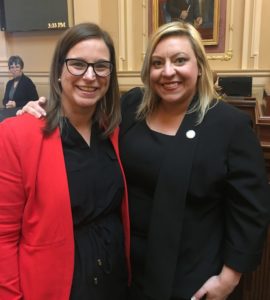Why Advocacy Must Be a Part of our Community Impact Strategy
By Erin Rice, President-Elect

A year of firsts
For the past 15 years, I have served as a public safety advocate before public policymakers in the Virginia General Assembly. When I began my career, there were only 16 total female members out of 140, and no female legislator held caucus leadership or a committee chair position. As a young professional, that was a little discouraging for my career path moving forward. But I am happy to report that dynamic has changed over the years.
In January 2020, a record 30 women were sent to Richmond to represent their communities in the General Assembly. They have brought unique perspectives to the many topics of debate in the halls of the “Mr. Jefferson’s Capital.”
Also for the first time, women hold central leadership roles in both the House of Delegates and the Senate of Virginia. The Virginia House of Delegates is led by Speaker Eileen Filler-Corn. This is a role that no other female has ever held in the 400-year history of the Virginia General Assembly. The Virginia Republican Caucus is also led by a female, Kathy Byron, for the first time. Many of the committees and subcommittees are now chaired by women as well.
How we can help make a difference
The 2020 General Assembly Session is shaping up to be truly historic, and I can think of no better time for the women of the Junior League of Norfolk-Virginia Beach to increase our involvement in the public discourse of issues impacting our communities.
Far too many people look at advocacy and engagement in the political process as dirty and self-serving. However, it is at this level of volunteer engagement that true change and reform can begin. Without a strong advocacy initiative, we will only continue to treat the symptom without fixing the underlying cause of the issue itself. We have all gotten sick—some more than others if you have young children in school! And while you can take something to treat the coughing and sneezing, if you do not cure the infection, then those symptoms will only continue to need assistance.
Let me further explain. Two years ago, the Junior League of Norfolk-Virginia Beach adopted Children’s Literacy as one of its community impact strategies. Since that time, we have implemented numerous wonderful community projects that provide books and educational programming for the children throughout South Hampton Roads. As members of JLNVB, we take to heart that even one child struggling to read is one child too many. Children’s Literacy is the first step to unlocking many opportunities, and learning to read is essential to achieving our future potential.
But our mission shouldn’t stop at providing programming. The Virginia Department of Education reported that the statewide percentage of students meeting the third grade reading assessment level has decreased from 76 percent in 2016 to 72 percent in 2018.1 Throughout Hampton Roads, three in every ten students are falling behind on reading comprehension. There are many factors that play into this, and some have nothing to do with reading itself. As an organization of literacy advocates, we can take our impact even further by educating ourselves on the issues and researching opportunities for improvement. The ultimate goal is to have all children reading proficiently.
Another example is our commitment to eliminating Period Poverty. As of the publishing of this blog, this year’s Little Black Dress Initiative alone has raised more than $7,000 and collected more than 4,000 products to combat Period Poverty in Hampton Roads. It’s an amazing accomplishment that we should be proud of. Now, our next step is to ensure this isn’t an issue being singularly supported by community organizations.
There are currently 4 bills in the Virginia General Assembly that address the issue of Period Poverty. The first two are SB232 and HB405, which mandate that School Boards provide menstrual products for free in all public schools grades 5-12. Both bills have passed their original house and are moving forward in the legislative process. The next two are SB231 and HB469, bills that would eliminate the sales and use tax on menstrual supplies. While SB231 passed the Senate of Virginia, HB469 failed in the House of Delegates. The passage of all four bills would be major progress in the fight to eliminate Period Poverty. In order for these bills to become laws, they must pass multiple stages in each house and the governor must sign them into law.
Advocacy is our way of ensuring the work we do does not stop with our work alone. It takes our impact further by influencing decisions that ultimately support our mission as an organization.
1 Virginia Department of Education. (July 1, 2019). Performance Measures. Department of Planning and Budget.
Retrieved November 18, 2019 from http://publicreports.dpb.virginia.gov.


